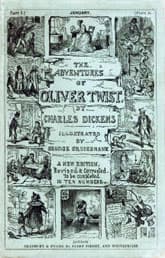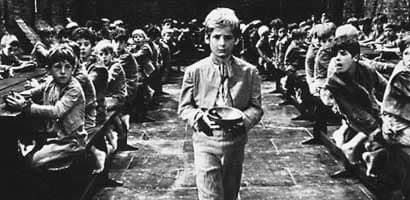Oliver Twist
Critique • Quotes • Text • At the movies
 First serial publication
First serial publicationAlso known as
The Adventures of Oliver Twist and Oliver Twist; or, The Parish Boy's Progress
First publication
1837–1839 in Bentley's Miscellany
Publication in book form
1838
Literature form
Novel
Genres
Literary
Writing language
English
Author's country
England
Length
Approx. 166,000 words

Under David Lean's direction, John Howard Davies is the classic Oliver Twist.
Master Oliver
Oliver Twist (1948): Film, 116 minutes; director David Lean; writer Stanley Haynes, Lean; featuring John Howard Davies, Alec Guinness, Robert Newton, Anthony Newley
Leave it to the Brits to really get it right. David Lean's 1948 Oliver Twist is about as perfect an adaptation of a classic as you can imagine in the single-episode format.
The cast is stellar. At the centre is John Howard Davies, age nine, in his first of only a handful of acting roles (Davies went on to a long career as a director and producer) but perfect as Oliver Twist. The role does not require as much acting as reacting, as Oliver is a boy to whom things happen, but I suspect good direction helped him react naturally to each situation, rather than play the same note of pathetic victimhood over and over.
Stealing the movie though, as they should, are Alec Guinness as Fagin and Robert Newton as Sikes. Guinness is, as usual for him, almost unrecognizable. Beneath the miser makeup, fake beard and huge nose is a man who can not only scheme and brutalize but can entertain the boys with delightful turns and, when things are going badly, can make us feel his anxiety.
Newton is the most malevolent Sikes imaginable, mainly because he seems so real. It's the first time the villainous character really comes to life on screen. His mate and victim, Nancy, is also played brilliantly by Kay Walsh (incidentally Lean's wife at the time).
Even the erstwhile beadle Mr. Bumble is a joy to watch, as his larger part is restored in this version and essayed by the chubby veteran character actor Francis L. Sullivan (just two years after he played Mr. Jaggers in Lean's Great Expectations).
And watch for a young Anthony Newley as a terrific Artful Dodger.
Until near the end, Lean's production is faithful to the plot, very much more so than the previous Hollywood film version. We get all the key scenes from the novel, including the fight at the undertakers, the Beadle-Matron courtship, and Sikes's desperate flight across the rooftops. An innovation here though is Sikes tries to take Oliver along with him, putting the boy in jeopardy in a way he wasn't in the book.
And the relationships of the last part of the book, resolved in such a complicated fashion by Dickens, are greatly simplified. Oliver turns out to be Mr. Brownlow's grandson, that's all—cutting out eighty pages of subplots. At just under two hours, the film makes exactly the right decisions as to what to keep and what to lose.
Most importantly though, Oliver Twist is directed masterfully. Every scene, starting with the opening storm leading to the workhouse birth of the boy, is visually and emotionally engaging. One can forget about comparing the movie to the book and just sit back to enjoy the cinematic experience. At under two hours, this film may not present the same experience as reading Dickens but it is a work of art in its own right, crafted with as much skill and passion.
— Eric

